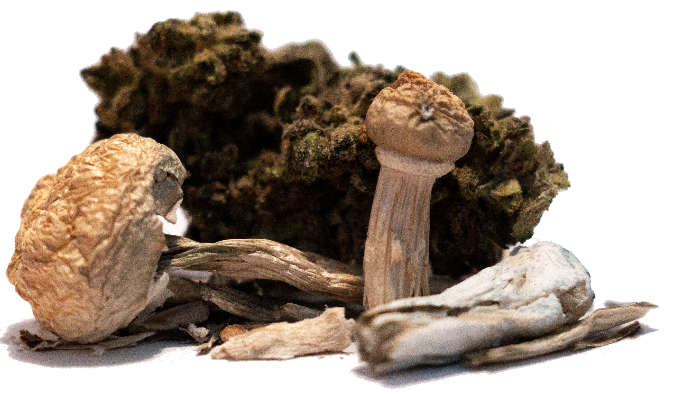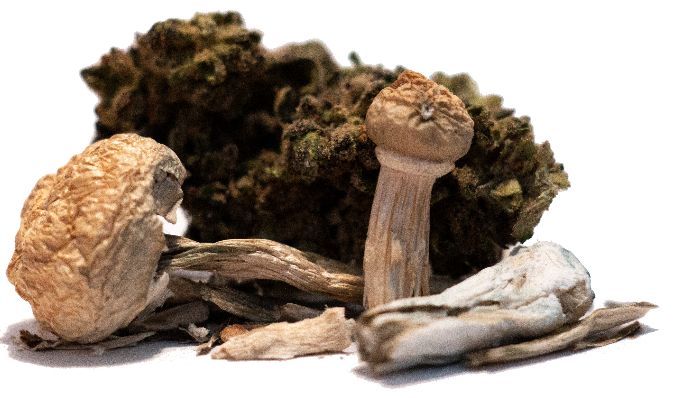
By Charles Wilson
Multimedia editor
When the world is falling apart, the relaxing effects of an array of different substances can be enticing. People are ditching the planes and hotels and instead opting to take a trip on psilocy- bin-containing mushrooms these days. But can you stay safe from COVID-19 when you are buying or selling?
A user can do themself harm by taking a substance, but an entire community can be infected with COVID causing widespread damage.
To get a sense of the situation, I decided to talk with Doug Babcock, director of Public Safety at St. Michael’s College, as well as two drug dealers and one person who buys weed, about their concerns, their ethics, and the safety precautions they have in place.
Weed and mushrooms, if tested and confirmed to be the substances they claim to be, are both physically non-addictive according to the United States National Institute on Drug Abuse, and chemically safe according to a 2019 study done by King’s College London. These substances can, however, be psychologically addictive. The physical safety is surprising considering both are federally classified as Schedule I, the harshest classification that can be given by the DEA. But take note, psychological complications can occur if there is a family history of schizophrenia or other serious mental disorders.
Greg Fowler (not his real name), who has been dealing out of northern New York and Vermont for a few years, managed and distributed over ten thousand dollars in drugs since 2020 started. “I’m a firm believer in not touching anything that’s addictive. I would never give anyone anything that I haven’t already tried myself to know that it’s safe. I couldn’t live with myself if I hurt someone.”
COVID-19 has changed some of the dealing experience, Fowler said, noting that he has seen a significant increase in the demand for mushrooms. “Nowadays,” he said, “psychedelics have been super popular because nobody wants to leave the house, so with psychedelics, you can go on a trip without moving.”
Making COVID Changes
“I wasn’t gonna drop out of it. It’s a pretty easy source of income and for the most part, people are pretty respectful.” Fowler said. Focusing on the safety of his customers and the community as a whole during the pandemic has resulted in some changes. The biggest reason why his concerns for his personal safety are low regarding COVID is that he doesn’t have direct contact with customers. “I do the logistics, ordering, and financing.”
Fowler said he has used his contacts and knowledge of managing the back end of drug distribution to make the front end safer for everybody involved. “Instead of dealing with people face to face, a lot of the time what I’ve been doing is processing a lot of custom orders for people,” he said. “I’m basically able to operate on a global scale, if I want to, from the comfort of my own home.” For any in-person sales, Fowler said he requires customers to use a mask, and pay through Venmo or Bitcoin to decrease the length of time required for a sale. But he, along with his suppliers, use a combination of Bitcoin, cash, and Venmo. For the sake of safety and decreasing the length of time required for a sale, he prefers Venmo or Bitcoin. “I always treat everyone like my best friend. You never wanna hurt one of your friends.”
On a smaller scale, Ricky Talbot (not his real name), a student, who sells weed to other students, said that sales have been slow this semester. There’s no demand for anything other than weed, and even weed sales are dwindling. “I feel like there’s less going on because we can’t access everybody’s buildings anymore. I feel like with Pub Safe always being around there’s just less activity happening,” Talbot explained.
Describing the sales, Talbot said it’s a quick turnaround. “They say what’s up and they leave. It’s not really a long interaction.” Sales are definitely down because of that decreased opportunity to sell, he said. “We just kinda stopped pushing because nobody really hits us up anymore. It was popular for the first two weeks of school and now nobody really asks.”
The Buyer
When it comes to spreading COVID-19, it takes at least two. I spoke with another anonymous source, who I’ll call Anthony Trenton, about what it’s like being on the other side of the equation. “I’m in a lower-risk age group,” said Trenton, “so I’m not really as worried but I’ve seen some pretty weird effects on younger people like NBA stars that have breathing problems still months after they’ve had it. That’s kind of worrying to me.”
Describing his own purchases from dealers, Trenton said the interactions are “mostly contactless,” but he added that “most dealers do request cash even in this time which I think is kind of odd.” To some drug dealers, leaving a trail of money through apps like Venmo is worse than the possibility of catching COVID.
“I wear my mask when I’m in my dealer’s residence,” Trenton told me. “They usually do not, that’s kind of their decision. Out of respect, I keep my mask on but it’s their decision to wear it or not in their own residence.”
Without taking the proper precautions, the person who sells him weed could not only give Anthony COVID-19 but also his other customers.
Staying Safe
I wanted to talk with Doug Babcock, head of Public Safety at the college, for more information. The main way drugs are discovered on campus is through people with behavioral issues caused by drugs. “I think overall, activity on campus is lower,” he explained. “But I can’t speak to anything specific about the drug trade.”
As for COVID concerns, Babcock said there are no COVID guidelines specifically targeting drug deals, saying “Any restriction we have on campus, beyond what the normal expectations for behavior and life are, that are related to COVID, are related to COVID. Nothing else.”
Babcock’s take on drugs is plain and simple — “Don’t do drugs, don’t buy drugs, and don’t sell drugs. There’s no justification for that on campus.” The federal laws surrounding all drugs, including cannabis, override the state’s choice to allow recreational use. The college and Public Safety have to follow federal guidelines for enforcing drug possession and sales on campus.
For weed, psychedelics, and other non-opioids, “You’re along for the ride and wherever that train goes, you’re going. We had a kid back probably eight or ten years ago now who jumped off the Lime Kiln bridge onto the train tracks and broke both of his legs. It’s brutal,” Babcock recalled. “Safety doesn’t exist.”
Even if you’re sober, you aren’t in the clear. The process of obtaining drugs can go south, fast. “A few years ago we had an incident where someone brought somebody on to campus in reference to a drug deal. It ended up involving a huge mess and the police and the end of educational careers for people,” Babcock told me. “The effects that the person doing this has on their own life are massive.”
But if you do choose drugs, how can you minimize the risk of COVID and protect our campus? “COVID doesn’t care what the deal is, what the product is,” Babcock warned. “It only cares that it gets the chance to be transmitted through the ways that we know and gets limited by the things that we know and have in place on campus.”
Wear a mask, social distance, keep the transfer contactless if possible, and use apps like Venmo, Cashapp, or, if you insist on there being absolutely no paper trail, use a cryptocurrency such as Bitcoin, Litecoin, or Ethereum. “COVID is the same whether you’re buying groceries, toys, or drugs,” Babcock said. For the safety of yourself and the campus as a whole, if you’re buying drugs, use the safety precautions that the college enforces in any other interaction on campus.


